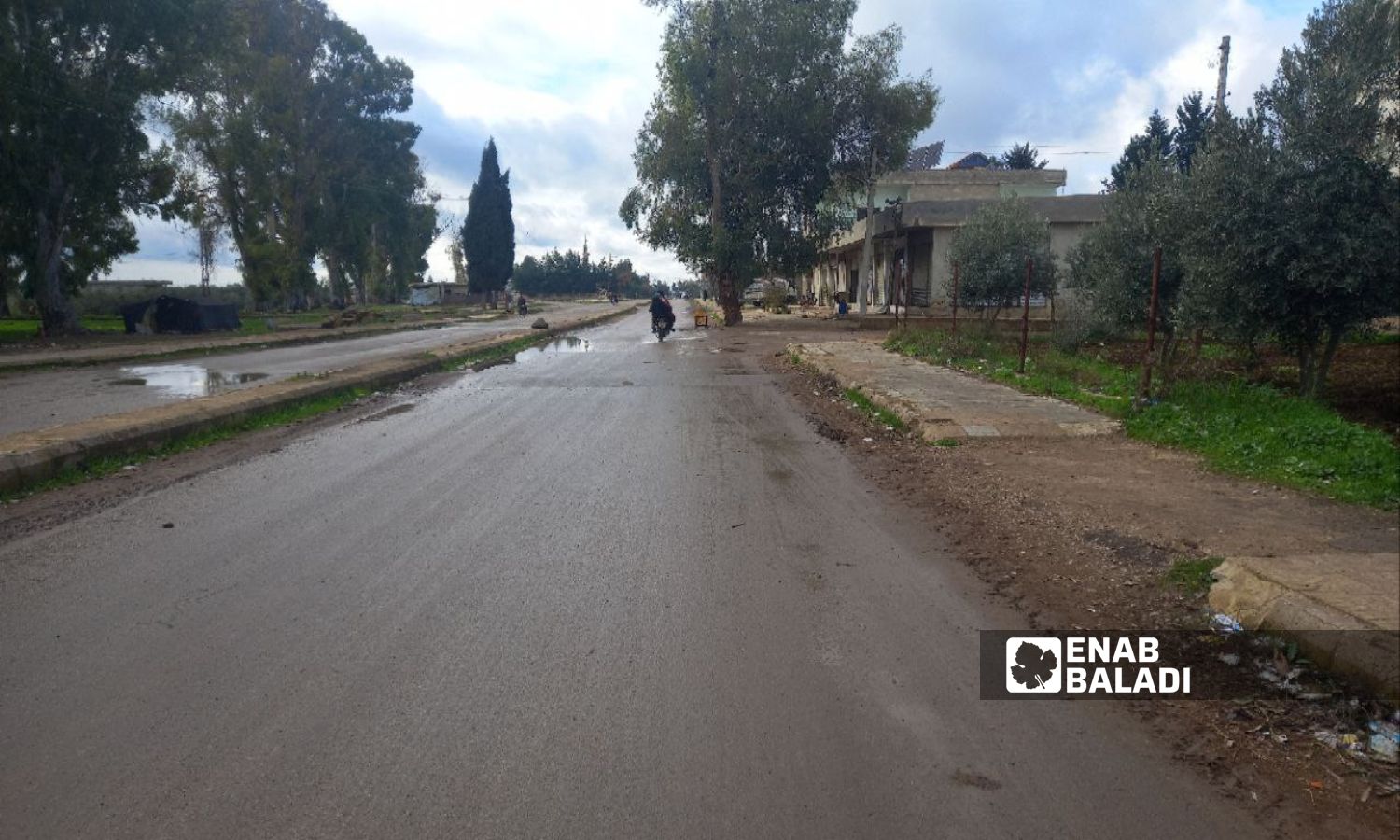



Daraa – Halim Muhammad
The town of Jilin in Daraa’s western countryside is witnessing ongoing operations of cutting down Kina (eucalyptus) trees around the town, affecting its aesthetics and green cover, as Jilin is considered one of the touristic sites in Daraa.
The town of Jilin is located on the shoulder of the Yarmouk Valley to the north, with trees covering the houses in it like a green bracelet circling around.
Residents of the area expressed their concerns about the continuation of logging operations and some of them told Enab Baladi that the sound of saws is relentless every night under the supervision of the local factions responsible for the town.
The local factions are armed groups that were affiliated with the former Free Syrian Army (FSA) and after the “settlement” in July 2018, some of them became affiliated with the Central Committee, which consists of nobles, religious leaders, intellectuals, and commanders to negotiate the Russians and the Syrian regime on the terms of the “settlement”. Others follow the Military Security in the Syrian regime forces.
Ahmed (40 years old), a resident of the town, said the number of trees surrounding the town has begun to decrease with systematic cutting that began several years ago but has increased this year, especially with the approach of the winter season. He added that the felled trees go to the account of firewood merchants under the supervision of local factions.
A member of the Reform Committee (which is a local committee overseeing the provision of services in the town) told Enab Baladi that the cutting operations were originally for the dry trees, but then extended to include the old green trees.
He added that those in charge of cutting the trees distributed about 50 tons to the poor in the town, independent of the local committee there, and that the distributed quantities are small and cover only a small part of the residents’ needs.
Jilin is considered a touristic town due to its location overlooking the Yarmouk Valley, and it is visited by tourists from different areas of Daraa and from neighboring provinces to relax away from the hustle and bustle of the cities.
Omar, a resident of Jilin, said that the outskirts of the town witness wide gaps that were covered by Kina trees that are over a hundred years old.
He said that tourists spread the ground under the town’s trees and groves in the summer, and if the cutting of trees continues, the town may lose its trees and its touristic features.
The logging of trees is not limited to the town of Jilin, as most of the shrubs, forests, and wooded hills in the towns of Muzayrib, Tal Shihab, and Yarmouk Basin villages, Tal al-Jabiya, Tal al-Jumu’a, and the free zone forest in Nassib and Daraa al-Balad have been affected.
The area of forested sites in Daraa governorate amounts to 10,624 hectares, according to Jamil al-Abdullah, the director of the Forestry Department in Daraa, who noted that the afforestation plan for this year is up to 80 hectares, which is about 110,000 seedlings of forest trees.
In November 2022, Ali Thabet, the director of afforestation in the regime’s Ministry of Agriculture, explained that the area of forested properties is currently no more than 3% of Syria’s area, while it was 15% of the country’s area before 2011.
The rise in heating costs in Daraa led to searching for heating means by logging trees, which is managed and benefited from by a group of merchants with cover from faction leaders, while most residents resort to benefiting from branches or digging at the roots, according to residents who spoke to Enab Baladi.
The price of a ton of Kina wood reached two million Syrian pounds (1 US dollar equals 14,600 pounds), and the price of a ton of olive wood reached three million Syrian pounds, as well as the price of oak wood. Meanwhile, the price of a ton of grape and cypress wood decreased to a million and a half Syrian pounds, considering it to be of lower quality and burning faster since it does not last in the stove and emits annoying smoke, according to wood merchants Enab Baladi met.
The high cost of firewood coincides with the rise in diesel fuel prices, with the price per liter reaching 14,000 Syrian pounds, making it an unlikely option for most residents, while the subsidized diesel allocations (50 liters) are not enough to meet home heating needs for a period of more than ten days.
A United Nations study published in 2020 estimated Syria’s need for 360 million dollars to stop the deterioration of the environment in the country by 2030.
if you think the article contain wrong information or you have additional details Send Correction